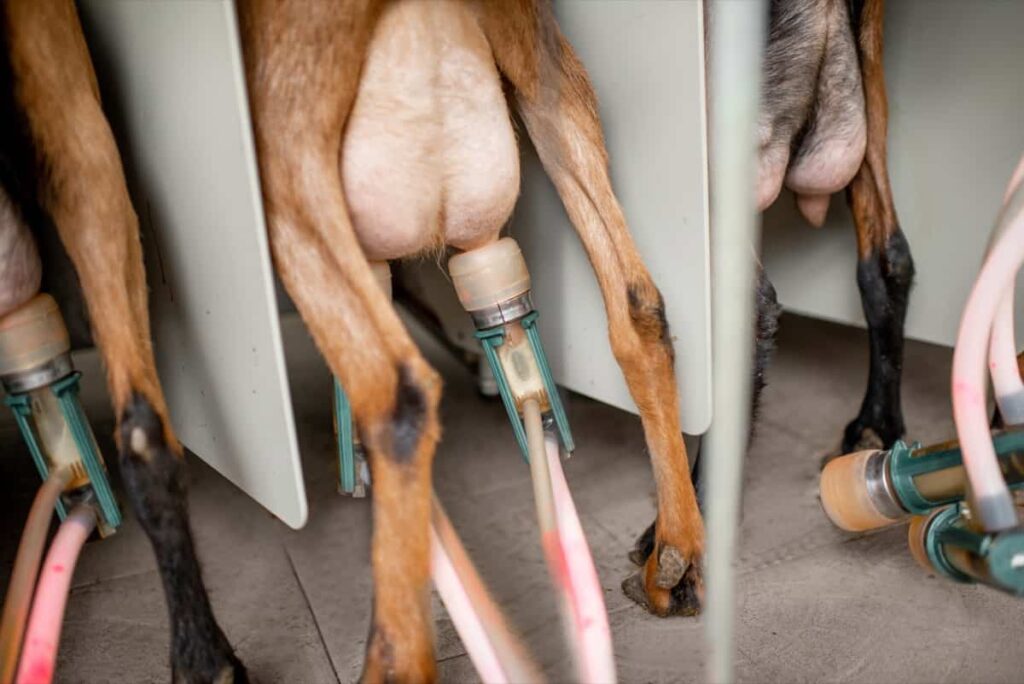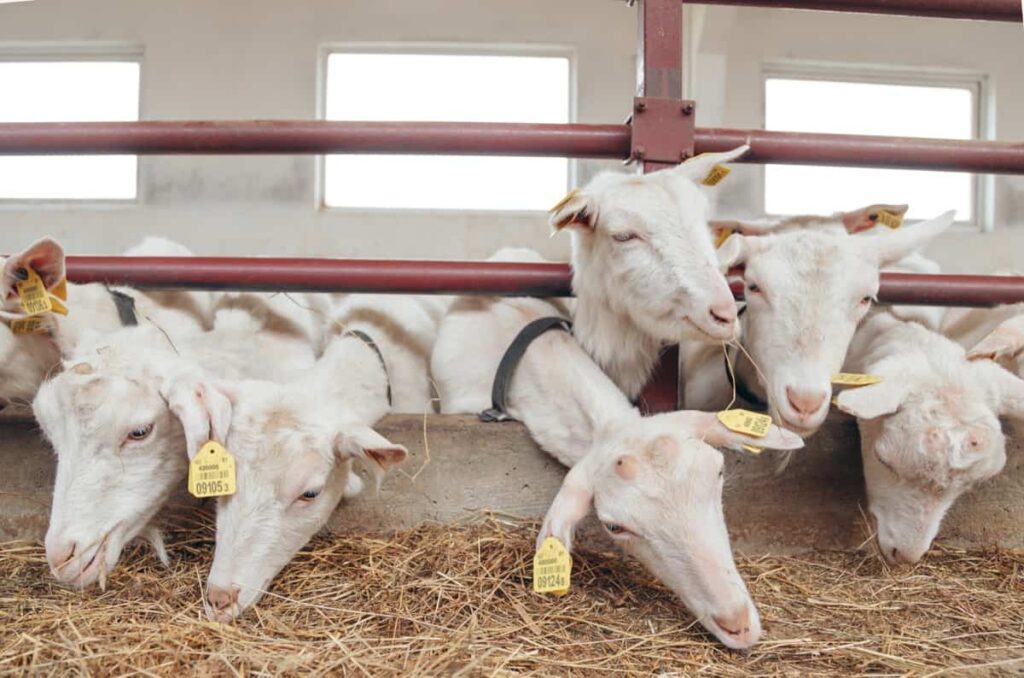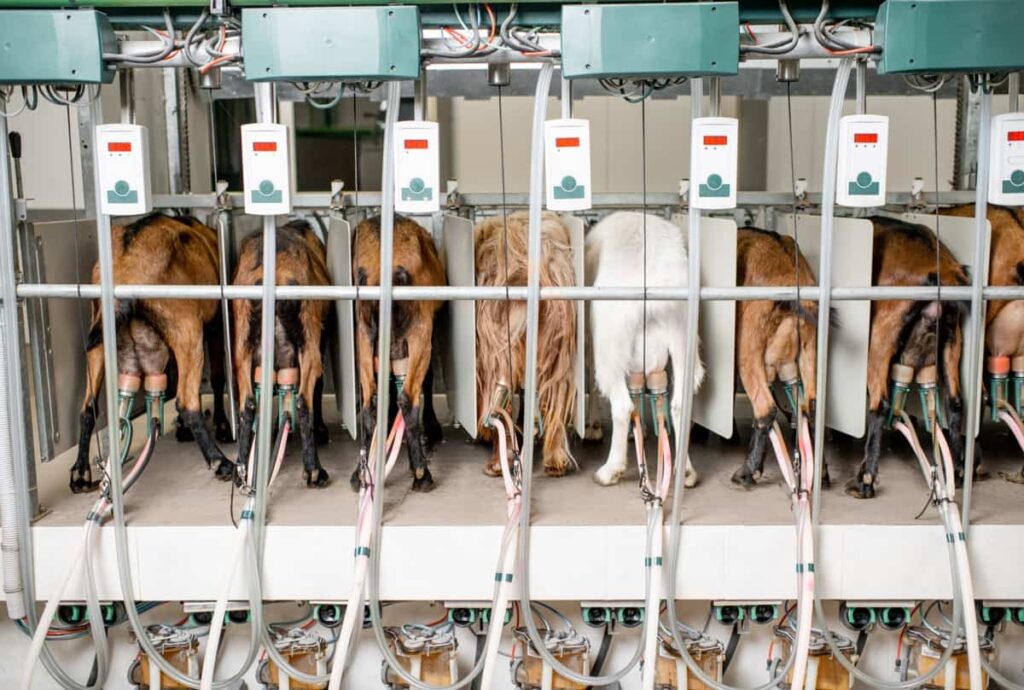Raising dairy goats can be an excellent source of income or a hobby farm endeavor while providing delicious fresh goat’s milk that you can enjoy yourself or sell locally. Keeping your dairy goats healthy is vital to ensure a steady supply of milk production. A dairy goat is a breed of goat that is specifically raised for milk production. While all goats produce milk, not all breeds are suitable for commercial milk production due to their low yield or poor quality.

Dairy Goat Breeds Information for Beginners
Benefits of Raising Dairy Goats
- Milk production: Goats produce large quantities of milk that can be overwhelming for small families; dairy goats typically have just enough milk for a family or small group
- Versatility: Goat’s milk is versatile and can be used in many recipes for cow’s milk, including cheese, yogurt, and ice cream.
- Nutritional benefits: Goat’s milk is more protein than cow’s milk and contains more vitamins and minerals, such as calcium, iron, and vitamin B12.
- Easy to handle: Dairy goats are generally easy to handle and require less space than cows. They also have smaller appetites than cows, so they eat less hay, making them cheaper to maintain overall.
- Sustainable farming practice: Raising dairy goats is an eco-friendly alternative by reducing the environmental carbon footprint since they need considerably less land and water resources than other livestock animals.
How to Care for Dairy Goats?
- Caring for dairy goats is an essential aspect of goat farming. Proper care and management of these animals contribute to their optimal health, productivity, and overall well-being.
- Make sure your goats have access to clean drinking water at all times. Please provide them with fresh hay or pasture grass for grazing and a balanced diet with minerals and vitamins. Goats need enough space to move around freely, so ensure you provide adequate shelter and fencing.
- Prioritize hygiene in the goat housing area by cleaning it regularly. This practice reduces the risk of spreading diseases among the herd while promoting cleanliness for milking purposes.
- Keep your dairy goats healthy by scheduling regular check-ups with a veterinarian who can advise on vaccinations and treatments against parasites such as worms.
Tips to Keep Dairy Goats Healthy
- Proper nutrition: Give your dairy goats a balanced diet with hay, grains, and freshwater daily. You can also supplement your diet with minerals and vitamins.
- Regular exercise: Dairy goats require regular exercise to maintain good health. Please provide them with ample space to move around freely.
- Vaccinations: Schedule routine vaccinations for common diseases such as tetanus, clostridium perfringens type C&D, and pneumonia.
- Parasite control: Deworm your goats regularly using appropriate medications approved by veterinarians or prescribed by experts.
- Clean living conditions: Keep the barn clean and dry to prevent infections from spreading among the herd.
- Regular check-ups: Schedule regular check-ups with a veterinarian to identify early signs of illness or disease before they become severe problems.
How to Raise Dairy Goats for Beginners?
- Raising dairy goats for milk can be a rewarding experience, but it requires hard work.
- Start by selecting the right breed of goat that suits your needs. Consider climate, space availability, and milk production capacity when choosing Toggenburg, Saanen, or Alpine breeds.
- Ensure that goats have access to clean water and fresh food. High-quality hay is essential for their health, while grains should be given in moderation.
- Please provide them with proper shelter from extreme weather conditions. A dry and well-ventilated barn with enough space is ideal for the goats’ comfort.
- Keep up with regular milking schedules for maximum yield potential. Sanitation practices should also be observed during the milking time to avoid contamination.
- Recognize signs of illness early so prompt treatment can be administered if necessary. Consult a veterinarian for any serious concerns about their health or well-being.
- Raising dairy goats requires commitment, but it’s an excellent way to produce healthy milk products.
In case you missed it: Damascus Goat Farming Information Guide

Most Important Dairy Goats for Beginners
Alpine
The alpine goat breed originated in the Swiss Alps and is known for its hardiness in different environments. They are also highly productive milkers. They produce high-quality milk with a butterfat content of 3-4%. Additionally, they can provide up to 1 to 2 gallons of milk per day.
Saanen
Another popular breed is the Saanen goat, which also originates from Switzerland. These goats have a gentle temperament and are easy to handle, making them great for beginners. They also produce high volumes of milk, averaging 3 gallons per day. Their milk has lower fat content but is still great for cheese or yogurt.
Toggenburg
The Toggenburg goat might be a better option for those in warmer climates due to their heat tolerance and resistance to diseases common in hot areas, like parasites or bacterial infections. Toggenburg goats have an excellent udder conformation that makes them suitable for milking. Their milk is slightly nutty, setting it apart from other breeds’ products. They produce 1 1/2 gallons of milk daily.
Anglo Nubian
The Anglo-Nubian goat is a popular breed for dairy production due to its high milk yield and rich, creamy milk. This breed originated in England but has since spread worldwide. In terms of milk production, Anglo-Nubians produce around 1-2 gallons per day on average.
LaManchas
LaManchas goats are a unique breed of dairy goats originating in the United States. LaManchas produce high-quality milk with high butterfat content. They have 3 liters of milk daily.
Jamunapari
Jamunapari goats are one of the most popular dairy goat breeds in India and Southeast Asia. They are known for their high milk, 1.5-2.0 kg liters daily on average. Jamunaparis require good nutrition management as they have higher energy requirements than other goat breeds due to their high milk production capacity.
Nigerian Dwarf
It is a miniature dairy breed from West Africa. Despite their small size, they are excellent milk producers and have become increasingly popular among urban farmers. The main advantage is to produce rich and creamy milk with higher butterfat content than other breeds. Nigerian Dwarfs are also known for their friendly personalities and easy-to-handle nature. They produce around 2 quarts of milk per day.
In case you missed it: Goat Breeding and Genetics for Improved Productivity and Disease Resistance

Conclusion
Dairy goats have been bred over time to produce high-quality and flavorful milk with a higher butterfat content than cow’s milk. This makes it ideal for making cheese, yogurt, and other dairy products. Dairy goats require less space and feed to produce the same amount daily. They are also easier to handle because they are smaller than cows and can be trained easily.
- Types of Grass Growing for Goat Farm
- How to Train Goats for Milking: A Beginners Guide
- Goat Milking Practices and Equipment: A Beginner’s Guide
- Goat Farming for Fiber: Producing Mohair and Cashmere
- Maximizing Goat Milk Production: Tips for Dairy Goat Farmers
- Goat Farming as a Family Business: Strategies for Success
- Profitable Kenya Goat Breeds for Commercial Dairy and Meat Business
- Unlock the Secrets of Oberhasli Goat: Discover Raising and Management Practices
- Ultimate Guide to Myotonic Goats: Explore Profile to Raising
How do I receive training in goat farming?. I am in Pietermaritzburg in KWAZULU-NATAL Province.
Place give information on legal requirements to start goat farm in Sri Lanka